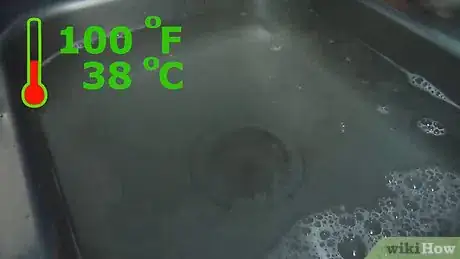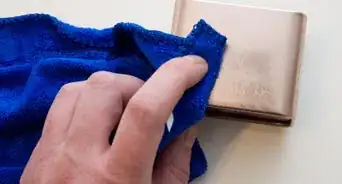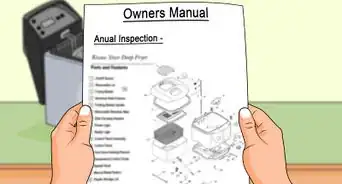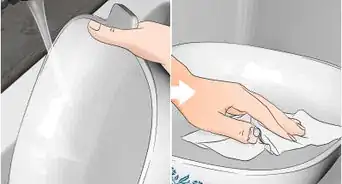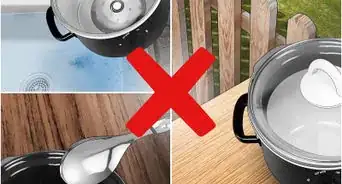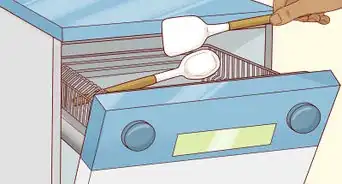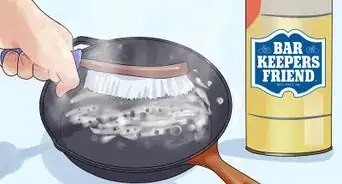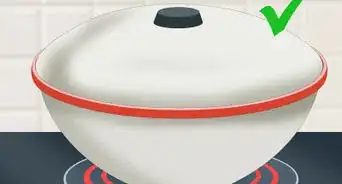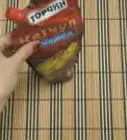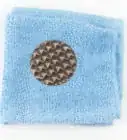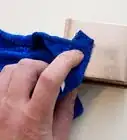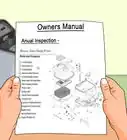This article was co-authored by Raymond Chiu. Raymond Chiu is the Director of Operations for MaidSailors.com, a residential and commercial cleaning service based in New York City that provides home and office cleaning services at affordable prices. He has a Bachelors in Business Administration and Management from Baruch College.
There are 7 references cited in this article, which can be found at the bottom of the page.
This article has been viewed 84,286 times.
There's no way around it - copper will tarnish without the proper attention. Therefore, if you use or display copper kettles or coffee pots, you'll need to clean them from time to time. Chemical cleaners can damage copper, but you don't have to take that risk. You can use natural products already in your home for safe, easy, and inexpensive maintenance.
Steps
Cleaning with Soap and Water
-
1Fill the sink with warm water. Be careful to keep the water lukewarm (about 100 degrees F/38 degrees C) and not scalding. You don't want to burn your hands!
-
2Add two to three drops of gentle dish soap. Look for soaps that contain as few ingredients as possible. Natural or eco-friendly soaps are a good choice. Avoid soaps that contain bleach or other harsh chemicals. These will damage the copper.[1]Advertisement
-
3Wash the kettle. Use a soft cloth or sponge to remove dust and dirt from the kettle. Rub gently, going in the direction of the "grain" of the metal.
-
4Rinse. Run warm water over the kettle. If you choose to use a sprayer hose, turn the water pressure down. Any remaining dust or dirt should come off easily.
-
5Dry. Rub gently in a circular motion until no water remains on or in the kettle. Make sure your towel is soft and free of lint.
Cleaning with a Vinegar Solution
-
1Make the vinegar solution. Pour equal amounts of vinegar, salt, and lemon juice into a mixing bowl.[2] Stir to combine thoroughly. The salt must be dissolved.
- If your kettle is made of especially fragile copper or has a lacquered surface, omit the lemon juice. Its low pH might damage these surfaces.[3]
-
2Dip a clean, soft cloth into the solution. Allow the cloth to soak up the solution completely. This will ensure that the kettle is cleaned thoroughly.
-
3Remove the cloth from the soak. The cloth should be saturated but not dripping. If it is dripping, wring it out into the mixing bowl.
-
4Rub the kettle with the soaked rag. Rub gently in sections, using circular movements. Make sure your movements are with the grain of the metal.
- You can also rub the kettle with a half a lemon that's coated with salt.[4]
-
5Rinse.[5] Use warm water for rinsing off the cleaning agent and grime. Simply put the kettle in the sink, and allow the tap water to run over the surface.
-
6Dry thoroughly.[6] Use a soft dry cloth or a paper towel. Finish the cleaning, and dry the kettle.
Cleaning with Buttermilk or Sour Milk
-
1Fill the kettle with boiling water. The heat from the boiling water makes it easier to clean the kettle's exterior quickly. Use caution to avoid burning yourself. Metal transfers heat to the surface very quickly.
-
2Apply buttermilk or sour milk. Dip a sponge or cleaning cloth into the buttermilk or sour milk. Make sure that the sponge or cloth has a smooth texture that will not scratch the surface of the kettle.
-
3Polish the exterior of the kettle. Rub the cloth or sponge gently over the surface. It is best to run in a circular motion with the grain of the metal.[7] This will clean away blemishes and return the shine to the kettle.
Cleaning with Ketchup
-
1Smear the kettle with tomato ketchup. Use a paintbrush or cloth to apply the ketchup to the surface of the kettle. Make sure the texture of the bristles or cloth is smooth. Otherwise, you could scratch the kettle.
-
2Leave the ketchup on the kettle for half an hour. Ketchup contains acetic acid, which reacts with tarnish to dissolve it.[8] Although some acids can damage copper, acetic acid is weak enough to pose no threat.
-
3Wipe off the ketchup with warm soapy water. Use a smooth cloth or sponge, and move in the direction of the grain of the copper to avoid scratching. The kettle should look marvelously clean again.
Community Q&A
-
QuestionCan a copper apple butter kettle be sandblasted?
 Community AnswerThat would probably be too much for the kettle. The best way to clean a copper kettle is to use vinegar and salt with a sponge or rag.
Community AnswerThat would probably be too much for the kettle. The best way to clean a copper kettle is to use vinegar and salt with a sponge or rag. -
QuestionWhat should the inside of a copper vessel (that you drink from) look like?
 Community AnswerIt should be the same color only a little rougher. It should be somewhat of a corrugated sheen.
Community AnswerIt should be the same color only a little rougher. It should be somewhat of a corrugated sheen. -
QuestionWhat do I use to clean the inside of a copper tea pot that's has not been used for a year or two?
 Community AnswerTry a little dish soap and baking soda. Use a sponge to gently scrub the inside till it is clean.
Community AnswerTry a little dish soap and baking soda. Use a sponge to gently scrub the inside till it is clean.
Things You'll Need
Method 1:
- Lukewarm water
- Gentle dish soap
- Soft cloth or sponge
- Soft dry towel
Method 2:
- Vinegar
- Salt
- Citrus (lemon or lime)
- Soft cleaning cloths/rags
- Dry cloth or paper towel
Method 3:
- Hot water
- Buttermilk or sour milk
- Sponge or cleaning cloth
Method 4:
- Ketchup
- Paintbrush or smooth cloth
References
- ↑ http://www.architecturaldigest.com/story/how-to-clean-copper-pots-and-pans
- ↑ Raymond Chiu. House Cleaning Professional. Expert Interview. 5 November 2019.
- ↑ http://www.mnn.com/health/healthy-spaces/stories/how-to-clean-copper-naturally
- ↑ Raymond Chiu. House Cleaning Professional. Expert Interview. 15 October 2019.
- ↑ Raymond Chiu. House Cleaning Professional. Expert Interview. 15 October 2019.
- ↑ Raymond Chiu. House Cleaning Professional. Expert Interview. 15 October 2019.
- ↑ http://www.motherearthnews.com/DIY/how-to-polish-metal-zmaz82mazglo?pageid=1#PageContent1
- ↑ http://www.dailymail.co.uk/femail/article-2841444/Shine-saucepans-tomato-ketchup-ingenious-ways-clean-house-food.html
- ↑ http://education.seattlepi.com/causes-copper-tarnish-4611.html
About This Article
To remove stubborn tarnish from a copper kettle, combine equal amounts of salt, lemon juice, and vinegar in a mixing bowl. Stir them together until the salt is completely dissolved. Dip a soft, clean cloth in the solution and squeeze it out so it’s damp, but not dripping wet. Go over the kettle in sections with the cloth, rubbing in small, circular motions. When you’re done, rinse the kettle thoroughly under running water, then rub it dry with a clean dish towel or cloth. For expert tips on how to do a gentle, routine cleaning with dish soap and warm water, read on!
